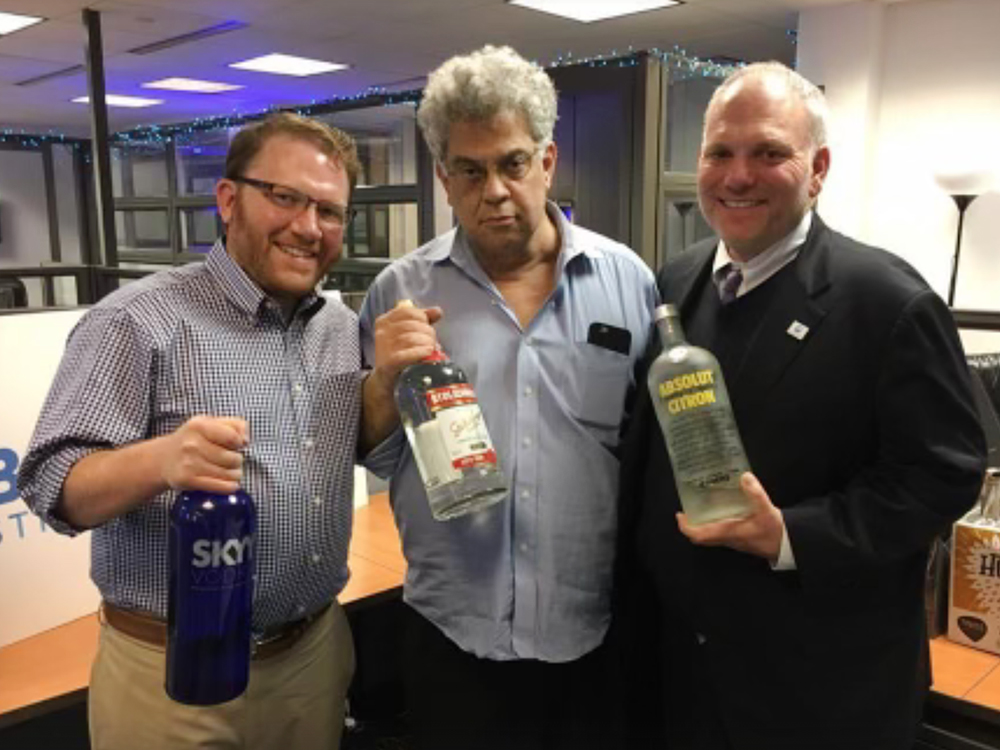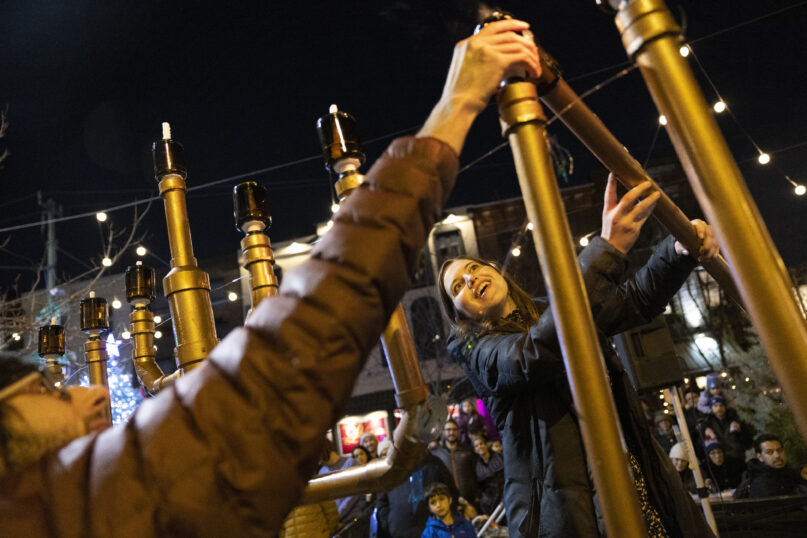(RNS) — For the past 28 years, the biggest and booziest inside-the-Beltway Hannukah party has brought together Jewish Washington for hot potato latkes, a vodka bar and Israeli-style sufganyot, or jelly-filled doughnuts.
Known as Latkes and Vodka, the trademarked shindig hosted by D.C. publicist Steve Rabinowitz has been the place to celebrate the eight-day Festival of Lights. Each year the coveted invitation-only party has drawn White House staff, a few members of Congress, Israeli Embassy staff, a couple of sitting ambassadors and about 300 Jewish community leaders.
But on Tuesday (Dec. 5), Rabinowitz sent out an email saying he had decided to forgo the celebration this year.
“I just don’t feel right hosting a party this year, given Oct. 7 and in the middle of an actual war,” Rabinowitz wrote.
Hanukkah, a joyous Jewish holiday, which in the United States has often tried to rival Christmas in buoyancy if not glamour, will not be the same this year. With the Israeli military in the midst of a destructive showdown in its war with Hamas, and with 1,200 dead in Israel and 16,000 in Gaza, few are in the mood to celebrate the holiday that begins at sundown Thursday.
Celebrations will, at the very least, be more muted. (The White House Hanukkah party is still on — slated for Monday.)

Aaron Keyak, from left, Steve Rabinowitz and William Daroff, CEO of the Conference of Presidents of Major American Jewish Organizations, at a Latkes and Vodka party several years ago. Keyak is now deputy U.S. special envoy for antisemitism. (Photo courtesy Steve Rabinowitz)
“I don’t entirely know how you can celebrate a festival of victory fully and completely when we are a people at war; that’s a challenge,” said Rabbi Brad Hirschfield, president of the National Jewish Center for Learning and Leadership.
Hanukkah celebrates an ancient military victory that was followed by a miracle. After a band of Jewish rebels rose up against their Greek-Syrian oppressors and rededicated the defiled Jerusalem temple, they found a small flask of oil that miraculously lasted eight days.
Hirschfield said he and his family will light the menorah each night and sing the traditional songs (in his house, he said, that’s accompanied by dancing) but he won’t host an open house as he does most years.
At Romemu, a New York synagogue known for its exuberant and mystical worship style, there has been no dancing at Shabbat services since Oct. 7.
“It’s just not the kind of celebratory, huge, untrammeled joy that we had before Oct. 7,” said Romemu Rabbi David Ingber. “We just changed everything to speak to healing a little bit more and to a spiritual reset every week because people are so inundated with news and with grief.”
RELATED: In US, some Muslim-Jewish interfaith initiatives are strained by Israel-Hamas war
Romemu will celebrate Hanukkah but in a more subdued way — leaning into its themes of holding on to moments of light and hope. The congregation is encouraging people to sign up to light menorah candles with other families and emphasizing togetherness.
Hanukkah has always been a very malleable holiday, reinterpreted throughout history in different ways, said Rabbi Jill Jacobs, chief executive of T’ruah: The Rabbinic Call for Human Rights.
“It’s one of these holidays that can just be interpreted and reinterpreted and the themes are always relevant, but they might be a little bit different, depending on the moment,” Jacobs said. “What keeps Jewish tradition alive is that we can both hold on to the tradition and also find new meaning in different moments.”
In stark contrast with Jews toning down the festivities, some non-Jews have canceled menorah lightings because of fears they might be seen as an endorsement of Israel.
A menorah lighting planned as part of a cultural festival in historic Colonial Williamsburg was called off. In Moncton, a city in New Brunswick, Canada, the City Council canceled a menorah-lighting on the City Hall lawn before reversing course after a public outcry.
For some Jews, those instances of exclusion might strengthen their resolve to double down on Hanukkah celebrations. Chabad, the Hasidic Jewish group, will still light dozens of giant metal menorahs in public parks across the nation, including on the Ellipse, near the White House, and at the southern entrance to New York City’s Central Park.
And, of course, many will try to keep up some festivities for the kids’ sake, at least. The 92nd Street Y, New York’s popular Jewish hub, is hosting a Hanukkah festival on Sunday (Dec. 10) with crafts, treats, a live game show and other entertainment for kids.
If there’s a softening of public displays of Hanukkah it will be for security reasons, said Rabbi Jacob Blumenthal, CEO of the United Synagogue for Conservative Judaism and its Rabbinical Assembly.
But he too said the emphasis in most celebrations is about light and hope — not victory.
“Our celebration is really about miracles and redemption,” Blumenthal said. “It’s not the celebration of victory itself. In a time when we are feeling anxious and we’re grieving, there is actually reassurance in looking back at past miracles and our history of perseverance and thriving that brings us comfort and encouragement.”
RELATED: What to know about Hanukkah and how it’s celebrated around the world





